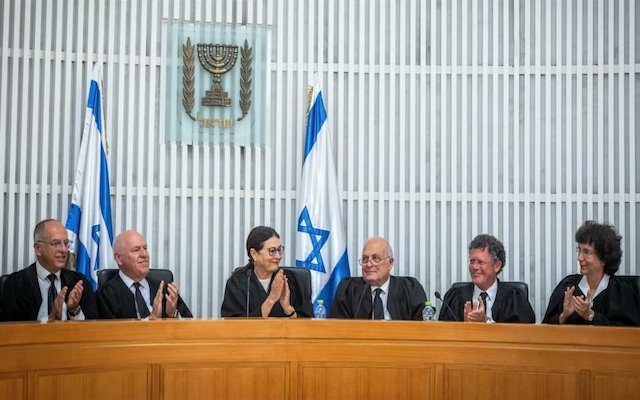In a landmark event, 15 judges from the Israeli Supreme Court convened today to deliberate on petitions challenging an amendment to the basic law of the judiciary, commonly referred to as the law on reducing the probable cause. This historic gathering marks the first instance in the State of Israel's history where all the Supreme Court judges have participated in such a discussion.
During the hearing on the petitions opposing the reduction of reasonable grounds at the High Court, Supreme Court Judge Noam Solberg expressed his criticism of fellow judges who occasionally invalidate fundamental laws using the Declaration of Independence. Solberg emphasized the importance of fidelity to history, citing David Ben-Gurion's explicit statement that the Declaration of Independence does not possess the authority to invalidate laws.
These remarks by Solberg were prompted by a discussion that ensued between the government's attorney, Attorney Ilan Bombach, and the Supreme Court justices. Bombach argued that the 37 individuals who hastily signed the Declaration of Independence should not impose constraints on future generations. This statement was a response to Judge Stein's assertion that the State of Israel is founded upon the Declaration of Independence. Bombach clarified that while the Declaration holds great significance, it does not carry legal status.
Israel's entire 15 person Supreme Court is sitting for the first time in history to hear arguments for/against the “reasonableness” law.
— Daniel Cohen (@DanielCohenTV) September 12, 2023
For a country with no constitution, Israel may be tip-toeing to a constiutional crisis.https://t.co/K4zd8NY9G2
The hearing witnessed a moment of tension when Member of Knesset Tali Gottlieb passionately reacted to a judge's mention of a bill aimed at altering the identity of the chairman of the election commission, potentially excluding Supreme Court judges from this role. Gottlieb vehemently argued that even if a judge did not preside over the committee, it would not be a violation of democracy, asserting that the Knesset does not infringe upon democratic principles.
Chief Justice Noam Solberg later articulated his belief that legislation is not the appropriate means to rectify the application of the Clause of Reasonableness. He referred to the government's efforts to attribute the amendment to the Basic Law and made it clear that he did not take a position on this matter, whether in favor or against. He suggested that if one were to support an unconstitutional constitutional amendment, it should be examined from a broad perspective, rather than considering each fundamental law separately. Solberg also noted that Israel has not yet reached the stage of having a constitution, making the use of this doctrine impractical at this juncture.
Thousands gather outside Israel's Supreme Court for a constitutional showdown vote on judicial reforms pic.twitter.com/tZo2XJJTiF
— TRT World Now (@TRTWorldNow) September 12, 2023
President of the Supreme Court, Esther Hayut, added that the Clause of Reasonableness stands as one of the primary tools at the court's disposal, having evolved through case law. She acknowledged that Solberg shared the view that there was room for reduction, but he did not believe that a fundamental law was the appropriate avenue for such changes. According to Hayut, the natural context for reducing such provisions is within the framework of court decisions.


